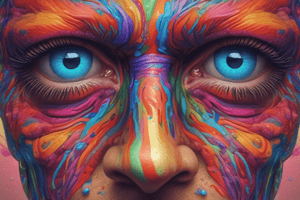Podcast
Questions and Answers
Which disorder is characterized by depressed mood for most of the day, poor appetite or overeating, low energy or fatigue, and feelings of hopelessness?
Which disorder is characterized by depressed mood for most of the day, poor appetite or overeating, low energy or fatigue, and feelings of hopelessness?
- Psychotic depression
- Postpartum depression
- Dysthymic disorder (correct)
- Bipolar disorder
What differentiates dysthymic disorder from major depressive disorder?
What differentiates dysthymic disorder from major depressive disorder?
- Symptoms are not as severe (correct)
- Presence of weight gain
- Impaired communication
- Onset in the early 20s
Which disorder involves extreme mood swings from episodes of mania to episodes of depression?
Which disorder involves extreme mood swings from episodes of mania to episodes of depression?
- Bipolar disorder (correct)
- Postpartum depression
- Dysthymic disorder
- Seasonal affective disorder
What is a key trait of hypomania compared to full mania?
What is a key trait of hypomania compared to full mania?
Which term describes a state characterized by excessive elation, inflated self-esteem, and grandiosity?
Which term describes a state characterized by excessive elation, inflated self-esteem, and grandiosity?
What distinguishes bipolar disorder from other depressive disorders?
What distinguishes bipolar disorder from other depressive disorders?
Which symptom is common in both mania and hypomania?
Which symptom is common in both mania and hypomania?
What characterizes a manic episode according to DSM-IV-TR criteria?
What characterizes a manic episode according to DSM-IV-TR criteria?
Flashcards are hidden until you start studying
Study Notes
Mood Disorders
- Also known as affective disorders, characterized by pervasive alterations in emotions manifested by depression, mania, or both
- Two main categories: Depressive disorders and Bipolar Disorders
Depressive Disorders
- Statistics: 18.8 million adults experience depressive disorders, with major depression being the leading cause of disability worldwide
- More women than men suffer from major depressive disorder
- Can occur in any age group, including infants, school-aged children, and adolescents
Bipolar Disorders
- Categories: Bipolar I Disorder (one or more manic or mixed episodes), Bipolar II Disorder (recurrent major depressive episodes with hypomanic episodes), and Cyclothymic Disorder (numerous periods of hypomanic symptoms and depressed mood)
- Characterized by rapidly alternating moods accompanied by symptoms of a manic and depressive episode
Risk Factors for Mood Disorders
- Prior episodes of depression
- Family history of depressive disorders
- Prior suicide attempts
- Female gender
- Age of onset younger than 40 years
- Post-partum period
- Medical comorbidity associated with high risk of depression
- Lack of social support
- Stressful life events
- Current alcohol or substance abuse
Etiology of Mood Disorders
- Biologic theories of depression
- Postpartum depression (occurs during the first 30 days postpartum)
- Psychotic depression (delusions or hallucinations in conjunction with mood disturbance)
- Seasonal affective disorder (SAD, depression occurring in conjunction with seasonal change)
Dysthymic Disorder
- Exhibits symptoms similar to major depressive disorder, but not as severe
- Does not include symptoms such as delusions, hallucinations, impaired communication, or incoherence
- Clinical symptoms persist for 2 years or more, with normal mood swings for a few days or weeks
Bipolar Disorder
- Formerly known as manic-depressive illness
- Involves extreme mood swings from episodes of mania to episodes of depression
- Descriptive terms used to describe the labile affect or mood changes: Euphoria, Elation, Rapid-cycling, Hypomania, and Mania
DSM-IV-TR Criteria for Manic Episode
- Distinct period of abnormal and persistent elevated, expansive, or irritable mood that lasts at least 1 week (or less if hospitalization is required)
- At least three of the following symptoms must occur during the episode (or four if the patient is only irritable):
- Inflated self-esteem or grandiosity
- Decreased need for sleep
- Very talkative
- Flight of ideas or subjective feeling that thoughts are racing
- Distractibility
- Increase in goal-directed activity or psychomotor agitation
- Excessive involvement in pleasurable activities that have a high potential for personal problems
Studying That Suits You
Use AI to generate personalized quizzes and flashcards to suit your learning preferences.




